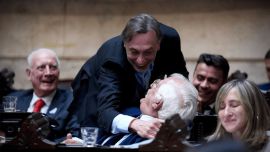Six weeks have passed since the last letter from Cristina Fernández de Kirchner shaking up the ruling alliance. A further electoral defeat had to ensue, followed by her silence over an agreement with the International Monetary Fund (IMF) coming into question.
Like the president, Fernández de Kirchner seems to have inaugurated another stage of government. This time her critique is centred on the opposition, underwriting the decisions taken by Alberto Fernández and closing with a quote from his speech which serves to remind him (and everybody else) of his own words: “Never expect me to sign anything which ruins the life of the Argentine people, never, never.”
The draft of the ‘Plan Plurianual’ spanning several years which contains the broad lines of an agreement with the IMF has still not reached Fernández de Kirchner but many people are insisting on knowing her position. The vice-president will back seeking an agreement with the IMF, but she will also revise the document.
“It’s in our clinical history,” they say in her entourage, but now Cristina has pinned the responsibility on the opposition.
“Can it really be that those who brought the IMF back to Argentina, restarting the tragic cycle of indebtedness which Néstor Kirchner had closed in 2005, do not take responsibility for anything?” she asked in her missive dated November 27. “Can it really be that those reciting the mantra nationwide and on every television channel that ‘we must take away Cristina’s Senate majority so that Congress does not rubber-stamp government’ now want ‘Cristina to define if the agreement with the IMF is good or bad?’”
The vice-president speaks of Alberto Fernández on two occasions. In the first, she makes it clear that it is the president who governs..
“Cristina does not have the pencil [to sign legislation] … the president always had, has and will have it. That’s not what I say, it’s what the National Constitution says. Let nobody be deceived as to who decides policy in Argentina.”
The second mention is to close her letter with a presidential quote. “Neither do I forget and furthermore I fully share the president’s speech last July 9 when commemorating Independence Day in Tucumán,” advanced the vice-president.
A reminder to everybody, including the president himself, who will soon be needing to close an agreement with the IMF.
“Never expect me to sign anything which ruins the life of the Argentine people, never, never. And I hope you understand me because if anybody expects me to yield to creditors or to a lab, they’re wrong,” said the president on that day. “I’m not going to do it. Beforehand I’d go home because I really wouldn’t have the nerve to enter this room if I did something like that.”
The message is clear: the running-mate is trusting in the president to honour his own words.
Once again, a letter from Cristina took the national officials and the president himself by surprise. The vice-president never gives away her moves in advance.
After rereading it several times, sources at Olivos presidential residence limited themselves to interpreting: “The vice-president’s text ratifies her support for the president in his negotiations with the IMF. We always paid and we must pay. She places this in the framework of growth quoting the words of the president from his July 9 speech. She reinforces the central role of the president within government while placing final sovereignty in Congress and including the opposition in the discussion because they contracted the debt and because they are going to have to assume their responsibility and vote for the agreement in Congress.”
Defeat and infighting
A fortnight after the elections, there was no mention of the electoral defeat. The letter only spoke of the triumph of Juntos por el Cambio to demand that in Congress they accompany “a possible agreement with the IMF over the US$57 billion requested by the Mauricio Macri government in 2018, of which the fine sum of US$44.5 billion was remitted in less than a year.”
She continued: “When the popular vote is sought in free elections, the responsibility of that representation must be exercised, even more when winning those elections. Or why would they want those seats? To collect the pay of deputies? Or perhaps to travel abroad with free tickets and expenses paid in dollars? Or jockeying for 2023 [presidential elections]?”
Another paragraph aimed at Juntos por el Cambio followed: “I must confess that the political irresponsibility of the opposition does not surprise me. The history of our country is plagued with political forces which reached government saying one thing and doing exactly the contrary once they had crossed the door into the Casa Rosada.”
The vice-president will not be saying anything publicly about the ruling coalition’s electoral defeat. Her analysis barely reached the ears of a tiny group to whom she thinks it is worth talking, which does not go much beyond her son Máximo, Interior Minister Eduardo ‘Wado’ De Pedro, Buenos Aires Province Governor Axel Kicillof, a few other governors and a couple of Greater Buenos Aires mayors.
For Cristina, it wasn’t just the economy. The former president also recognises that the strategy in drawing up the lists of candidates for Frente de Todos did not work out. Without knowing who said it first, both Alberto and Cristina agree on the need to open up the PASO primaries in 2023. In any event, the vice-president will make her 30 percent of the votes count in the future.
Nor did this letter contain any messages to the internal movements of recent days. This time she maintained public silence about the Alberto Fernández administration. In recent days Kirchnerismo has begun to hear about a “territorial Peronism” which will back the president and function as a kitchen cabinet to plan the administration, a new version of the Albertismo which never got off the ground. Those who frequent the president assure that he is prepared to take his own decisions and advance beyond the opinions of the alliance’s hardliners.
The sector responding to the vice-president does not disown this while the administration functions. As for decision-making, a kitchen cabinet can always be put together but a call from the vice-president to officials or the president himself can always deactivate any previous resolution.
If this Peronism is thinking of 2023, the president’s logic when he reconciled with his running-mate seems intact: “With Cristina it’s not enough, but without her, impossible.”
Kirchnerism has, several times in the past, seen Peronist leaders pluck up their courage in non-electoral years and be ready to emancipate themselves, something which has never yet happened.
CFK has broken her silence with the IMF as protagonist. There was no mention of justice, despite her and her children, Máximo and Florencia, having been acquitted in the ‘Hotesur-Los Sauces’ case only a few hours beforehand.
























Comments